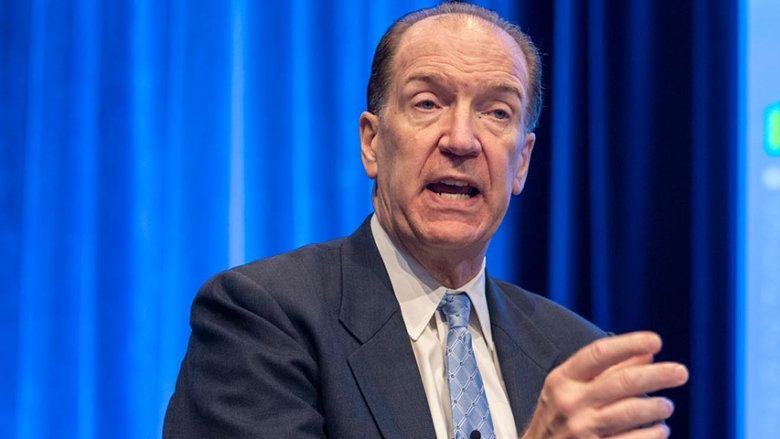MARKETS AND ECONOMY
World Bank cuts Nigeria’s 2021 growth forecast; explains why
Published
5 years agoon

World Bank cuts Nigeria’s 2021 growth forecast; explains why
The World Bank has revised downwards Nigeria’s 2021 growth forecast to 1.1 per cent from the 1.7 per cent it projected for the country in June last year.
Read Also:
The bank, which made the forecast in its semiannual Global Economic Prospects report released on Tuesday, said it cut Nigeria’s growth forecast for this year by 0.6 per cent because it expects economic activity in the country to be “dampened by low oil prices, falling public investment due to weak government revenue, constrained private investment due to firm failures, and subdued foreign investor confidence.”
According to the Bretton Woods institution, Nigeria’s economic growth this year is also expected to be weaker than earlier projected given that “private consumption prospects will be weighed down by lost incomes and higher precautionary saving among non-poor households, as well as lower remittances and the depletion of savings among poor and unemployed households amid inadequate social safety nets.”
The bank said it estimated that Nigeria’s economy contracted by 4.1 per cent in 2020—0.9 percentage point more than previously projected—“as the effects of the COVID-19 and associated measures were worse than expected and affected activity in all sectors.”
It further noted that agriculture growth slowed last year due to difficulties in transporting inputs and products to markets, even as weaker international prices and OPEC quotas hurt activity in the critical oil sector.
Similarly, the World Bank stated that output in sub-Saharan Africa contracted by an estimated 3.7 per cent—a per capita income decline of 6.1 per cent and the deepest contraction on record—due to Covid-19 and associated lockdown measures which disrupted activity through multiple channels.
Growth in the region, the bank said, is expected to rebound only moderately to 2.7 per cent in 2021—0.4 percentage point weaker than previously projected—before firming to 3.3 per cent in 2022.
It stated that while the rebound in private consumption and investment is forecast to be slower than previously envisioned, export growth is expected to accelerate in line with the rebound in economic activity among major trading partners.
The World Bank, however, stated: “Despite the envisioned recovery, the level of regional GDP in 2022 is forecast to remain below the level projected in January 2020.
The sluggish recovery reflects persistent outbreaks in several economies that have inhibited the resumption of economic activity, particularly in services sectors such as tourism.
“Although COVID-19 vaccine rollouts are expected to gather pace in early 2021 among advanced economies and major EMDEs—bolstering business and consumer confidence—logistical impediments are expected to delay vaccine distribution in the region.
“The pandemic is set to further scar potential output growth—which was already losing steam owing to a contraction in total factor productivity—and leave a damaging legacy in the region.”
Meanwhile, the World Bank also stated in the report that this year’s global economic rebound from the deepest recession since World War II would be slightly slower than previously expected due to the resurgence in virus cases across advanced economies.
According to the bank, global Gross Domestic Product (GDP) will expand four per cent in 2021, less than the 4.2 per cent forecast in June, followed by 3.8 per cent growth in 2022.
Estimating that the global economy contracted by 4.3 per cent last year, the development lender said there was an “exceptional level of uncertainty” about its 2021 growth projection, adding that the pandemic may also reduce potential global growth over a decade unless governments improve business climates, education and productivity.
“Policy makers face formidable challenges — in public health, debt management, budget policies, central banking and structural reforms — as they try to ensure that this still fragile global recovery gains traction and sets a foundation for robust growth,” World Bank President, David Malpass, said in his introduction to the report.
Share this:
- Click to share on X (Opens in new window) X
- Click to share on Facebook (Opens in new window) Facebook
- Click to share on WhatsApp (Opens in new window) WhatsApp
- Click to share on Pocket (Opens in new window) Pocket
- Click to share on Telegram (Opens in new window) Telegram
- Click to email a link to a friend (Opens in new window) Email
- Click to share on LinkedIn (Opens in new window) LinkedIn
You may like


World Bank Approves $500m To Expand Finance For MSMEs In Nigeria


Stability Without Relief? 10 Things the World Bank Says About Nigeria’s Reforms


139m Nigerians Still in Poverty Despite Tinubu’s Reform Gains – World Bank


World Bank Approves $300m to Support IDPs in Nigeria


World Bank Maintains Nigeria’s Growth Forecast at 3.6% Despite Global Economic Downgrades


World Bank to Withhold $10.4m Loan to Nigeria over Audit Deficiencies








